What are the assessments of women in fisheries on the impacts of globalisation and their prospects for a better tomorrow?
This interview is the first in a series of interviews that Mundus maris, consistent with the importance given to the gender dimension in its agenda, intends to do step by step with women involved in the use and / or value adding along value chains of marine or coastal resources.
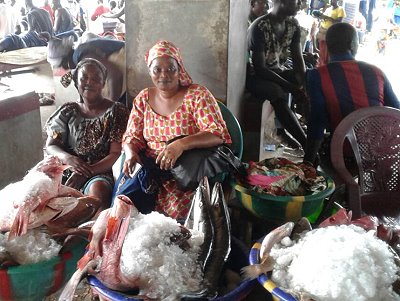
Madame Ramatoulaye Barry: As you can see, I’m a trader in fresh fish. I leave the house every day very early in the morning to go to the Boulbinet artisanal fishing port, which is my place of work, my office, if you will. I am absent only in the case of major social and family constraints. Here in Guinea there are several types of wholesalers and the category of operators to which one can belong depends on several factors, mainly the financial weight of the person in question.
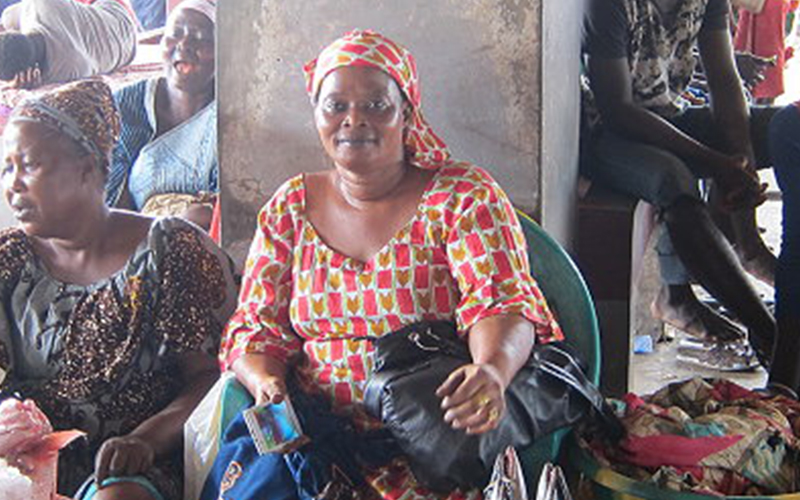
You have fishmongers with a lot of money who do not only have interest in fishing but in many other sectors. There are people who export fish, but have made money first in other sectors, such as real estate, appliances, textiles and even agriculture. These people are involved in the marketing of products for export or large-scale markets in Guinea. For a few years, we have had a phenomenon that is somewhat new in the history of small-scale fisheries, a growing number of Lebanese fishmongers which is supplying a middle class, even the well-off, as well as customers beyond the borders of Guinea. You even have Chinese and Koreans who come to Boulbinet’s artisanal fishing pier to buy products that they export. Some say that these products are going to Korea and China, but I can not say more, because we do not know much of how they work.
So, as you can see, there are several types of fish traders and the women you see around me, like Ms. Suyo Bangoura and I, are fishmongers who supply the local market. That is to say, we service households that spend either for the purchase of a quantity of fish just for the consumption of the day, or for a few days. As you can see the pieces in front of you, we are specialised in the marketing of high-value bottom-living species. It happens that a few people passing through Conakry come here to buy some pieces a few hours before their return trip. These are mainly people from the countries of the sub-region or Guineans living in the diaspora, about to return where they live. But given our limitations in terms of investment capacity, it rarely happens that a single woman provides the entire offer for demand from outside the borders of Guinea.
MM: How do you organise your work here?
R.B.: I do not know where you want me to start, but I will first talk about the means and conditions to put in place to have a prospect to get a foothold and stay in this demanding work. It’s difficult but we’ll talk about it later. So, for the means, that is to say the funds necessary to be able to buy and resell, we can only rely on ourselves. It is true that the authorities have set up this marketing platform, that is to say this shelter on the platform which has considerably improved the working conditions because before the development of this space, the hygienic conditions were unsustainable, especially during the rainy season with such a high rainfall here in Guinea. We waded in the water and that, in addition to public health problems, caused us a lot of economic loss because of a lack of means of conservation. Today, an ice factory is built on the dock, it is private, but it still makes accessible this luxury product for people who have the money to pay for it. There is still much to be done in terms of sanitation and food safety, but compared to what we had before, a lot of progress has been made and we thank the authorities. That being said, for the funds needed to fund our activities, women are always left behind.
MM: And yet in Guinea as much as in most countries in the sub-region, it is said that women are afforded certain advantages by financial institutions because they are held more responsible and committed. Isn’t that true?
R.B.: Unfortunately, it’s not quite that. I say this because, despite all the great discourse of the mutualist institutions and the many partners, who talk about the important role of women in fishing, the overwhelming majority of women who are in the same category as me, sticks it out in the business through networks, which are typical for our traditional societies.
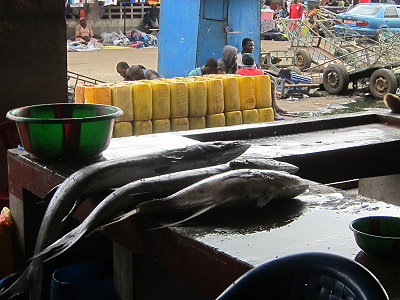
The big banks I do not talk about, because they are not interested in small-scale fisheries, whereas without us, the actors of the fishery – that is to say we, the women fishmongers and processors as well as the fishers who are our fathers, husbands, brothers or sons – I wonder what would become of everything that depends on fish for food and those people you see around us who depend on us for income.
To return to the mutual institutions, which were supposed to solve problems, listening to them seems interesting, but interest rates are judged unanimously as being too high. In addition to the sector facing a crisis, we hold to certain values that do not allow us to run the risk of being sued in case of non-repayment in time of a credit contracted. And with the draconian conditions of access to credit, including the high interest rate, the risk of ending up in this situation is more than certain. For all these reasons, we only count on our traditional systems: informal credit but also the family patrimony in its many forms.
In fact, many of the women you see around me, including myself, continue to rely on some family members if we need funding for our activities. It can be financing in the form of a loan from one of the family members for the purchase of fish that we pay back after the sale. It may also be a purchase on credit contracted with the canoe for the women among us who belong to a fishing family. But as I will explain, even if it may still be possible to get a cash loan from a family member, this form of finance from a fisher is becoming increasingly difficult to obtain, even within the same family.
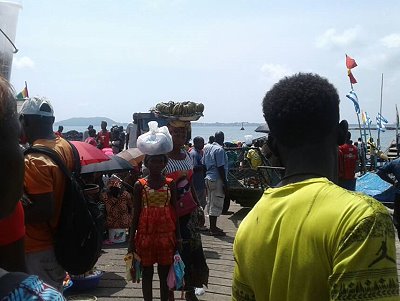
MM: So, if I understand you well the access to finance is the principal challenge women in the fisheries here have?
R.B.: No, the problems do not stop there. It’s a whole and it’s impossible to talk about funding problems like that in isolation. I emphasise this problem, because you asked me how we organise ourselves and, in my opinion, when we talk about organisation, it means first of all thinking about the conditions of access to finance. Now, with regard to the main issues facing female fishmongers like me today – as well as women fish processors who must not be forgotten because they face the same challenges – we must keep the following in mind. First, we are victims of changes in the social organisation of our communities. These changes occurred so brutally that we were caught off guard. I will explain by taking the example of the loss of economic power and consequently loss of social prestige. This prestige is traditionally granted us women by the place we occupy in fishing. We are traditionally considered as essential actors in the financing of fishing activities both upstream and downstream. Indeed, we are usually in charge of pre-financing fishing trips from our savings (from our tontines or family patrimony), but also from the marketing of landed products. From these responsibilities, we also derive the revenues that founded the place we occupied in the fishery.
M.M.: Would you specify this further? Where do these changes come from? Can you give concrete examples of impact on your work and your way of living?
R.B.: The market has turned everything upside down. As I told you, there are more and more operators from outside our communities and financially well endowed who are no longer content to order from the outside but settle in Guinea to better ensure their supply of fishery products, thus entering into direct competition with us. In addition to the huge financial resources available to them (Chinese, Korean, Lebanese, among others) to retain the fishers, some of these operators are developing strategies to move towards controlling the entire production.

Indeed, the trend for these three types of exporting operators is to invest in small-scale fishing where they have several boats that belong to them now.
In such a new context, it is obvious that our conditions of access to the raw material have changed profoundly. We talk here about the fresh product for the fish traders and for the fish processors, particularly the Boulbinet and Bonfi smokers. We no longer have this priority accorded by fishers on their catches. At the same time, with the immersion of these wealthy fishmongers (Korean, Chinese, Lebanese, among others) who offer more incentives to the fishers in the form of provision of a fishing unit for the fisher, they may offer substantial loans for the fishing trips, etc. we are beginning to be victims and seriously so of the development of international seafood markets.
MM: When you speak about the new context by making reference to market trends, can you identify the beginning of these developments?
R.B.: It is difficult for me to precisely define the beginning of this trend. If I speak of a new context, it is because it translates into fundamentally different working relationships compared with those which traditionally bind us to the fishers. Look on your left, there the passing cart is filled with beautiful pieces of groundfish – it is products landed by artisanal fishing units – belonging to Asians. Similarly, if you go to the Autonomous Port of Conakry, you will see that things have changed a lot and in a fast, unexpected way in the artisanal fishery, its organisation, the relationships between actors involved including our relations as women in the fishery with the fishers. Indeed, you will see from the port’s warehouses that a part of the population, including women fishmongers and processors: smokers of Bonfi, Taminataye and Boulbinet, are supplied with fresh products by Asians, owning traditional boats on which they make artisanal fishers work. And it is the species that these Asians call «African products» that are dumped on the markets of Conakry through agents they recruit locally.
MM: Beyond the access problems to the raw material you describe, are there other factors you want to mention?
R.B.: Of course there are others. You know that if we ourselves as the first link in the chain, as small-scale fishmongers, already have to group together several women in order to get better prices, we are facing stiff competition from the exporters. This translates into higher prices for what we buy, it can not be otherwise for consumers. We sometimes put the same product under ice and we are aware of the negative impact on quality. And a drop in quality inevitably results in an economic loss.
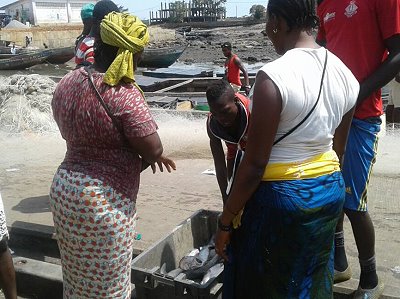
But it is not for pleasure that we keep a long time until alteration of the product. The reason we got to do this is the following: Sometimes we buy a very expensive product because of this competition, but then we have difficulties to sell it at a price level that allows us at least to cover our costs. And it is by dint of avoiding selling at a loss that we happen to lose everything.
By the way, I would like to mention that one of the major constraints is the cost of product conservation. Ice is still a luxury and until now we have not yet found technical partners that allow us to develop alternative conservation methods. These conservation problems concern both women who want to retail-market through the neighborhoods of Conakry and its suburbs and women like us, who sell in the port of Boulbinet and have problems to store quantities that range from 150 kg to 500 kg (group storage). It is true that the ice factory built on the site is very useful, but it would be important to see how to equip women with technological means for transport – for the fish trade in the capital and in zones peri-urban – and for on-site conservation for women up to four days in duration. These means would allow us to improve our working conditions and life because this would sustain the quality of the product. Who says quality improvement, says increase in the selling price. There are still people who have the means and are willing to pay for the effort to increase quality.
MM: Would you like to explain to us any other consequences of the opening of small-scale fisheries to international markets and the associated competition?
R.B.: We could chat until eternity without covering all aspects of the question. And as you see we are too busy to do this. But we must keep certain things in mind that we, women in the fishery, regard as impacts of globalied markets, namely: (i) the transformations experienced by our traditional organisation in the fishing communities, which have had a profound impact on our working conditions with effects on our relationships, our traditional and informal contracts with the fishers; (ii) the profitability problems of our activities due to, among other things, competition from foreign wholesalers with significant financial capacities on the one hand and transaction costs, such as the price of inputs such as ice on the other. You must recall another problem, that is to say, (iii) a constraining environment, which prevents us from developing our activities and improving our living conditions characterised by increasingly stringent restrictions of access to credit due to the reluctance of credit institutions and the lack of alternatives for us, apart from electricity, to keep our products for a few days, the time to sell them at the required quality for a good price.
MM: Just before we leave, what would be according to your view be the best ways and means to explore for improving your working and living conditions? How do you look into the future?
R.B.: Ice boxes in pirogues at Boulbinet port in 2017I do not know what my colleagues want to add, but as far as I’m concerned,
as there are problems, we have to look for solutions even if we can not fix everything all at once. In other words, it means that the place we occupy both in the national economy and in relation to issues as important as food security is well established. You agree, don’t you? If, as you say, you have those years of experience uin fisheries and you are from a fishing community, you will be very aware of that reality. Today, it is not a question of seminars anymore, which do not have any real impact on us. It is imperative that we act differently in favour of women in fisheries at the level of our respective countries and at the international level. As much as for the donors as for the NGOs that are interested in our problems like your Mundus maris association, you should give yourself time to stay with us in our communities. You need to stay the time it takes to really understand the profound changes women are facing with the changes brought about by the international demand for fish. Otherwise, by limiting yourself to meetings, seminars in hotels etc, you will always fail to appreciate the realities.
This is all the more important to understand when I notice that we are rarely listened to. It would be good to inform the international community of the level of deterioration of our working and living conditions, but that implies that you spend time with us, even if it may not be enough. I saw that you have come several times, which means that you are interested. And that’s the way to go. Also, these institutions should take at least 1% of the money they put into seminars and travel to support the establishment of guarantee funds in some countries, for example 2 to 3 pilot countries, for banks to experiment. I know they will not be disappointed because we are known for our seriousness. Everyone knows that women repay better than men. Now, at the level of our respective countries, we need training in entrepreneurship, for example on how to build up a commercial structure and be mentored to negotiate loans professionally from the authorised institutions. We realise that we are not equipped and structured to be taken more seriously by some banks. We terribly miss such mentoring. I will not be able to discuss all possible solutions, but it would be important for associations such as Mundus maris, who show solidarity towards women – through such an interview that obliged you to make several visits – to help us find sponsors, individuals or institutions, ready to accompany us. They should help us setting up a project to improve the quality of our products with alternative means such as waterproof boxes, like the ones you see there, but improved and adapted to our needs. By mobilising the craftsmen who have been working with the fishers for years – look at the ice boxes used on the pirogues – I am sure that the situation can be significantly improved. I have to leave now, but I wish you a good return.
MM: Thank you very much for your time, Madame Barry.
Aliou Sall posed the questions on behalf of Mundus maris. The fisheries country profile of Guinea produced by the Sub-Regional Fisheries Commission can be accessed here, while catches since 1950 reconstructed by independent research can be accessed here.
Entre tradición y la modernidad
- 2000 years ago: the ‘vivaria’
- La historia del esturión
- Mundus maris participated in the 2024 World Fisheries Day organized by Canoe and Fishing Gear Association of Ghana (CaFGOAG).
- Challenges and Opportunities in the sustainability of Inland open water fisheries in India
- April V2V lecture – Vulnerability to Viability: Mind Matters
- A glimpse at Marsaxlokk, the traditional fisheries harbour in Malta
- Entrevista con la Sra. Khady Sarr en el puerto de pesca artesanal de Hann
- Qué dicen las mujeres en la pesca artesanal en Hann?
- Women in fisheries: Interview with Ms Ramatoulaye Barry, leader of a group of women fish mongers in Conakry
- Interview with F. Soumah, leader of artisanal fishers
- A detour in the Boulbinet artisanal fishing port in Conakry, Guinea
